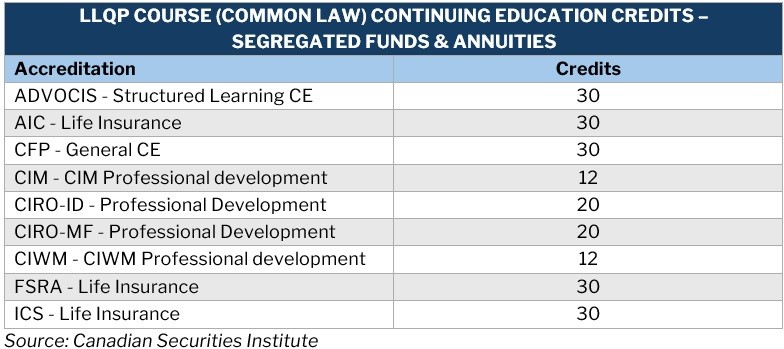Wondering if the LLQP course is essential to your career as a financial planner? Check out this guide to find out how it can push your career to the next level

Completing the Life Licence Qualification Program (LLQP) is a required step for anyone aspiring to become a life insurance agent in Canada. Apart from teaching the ins-and-outs of various insurance products, the program emphasizes ethical conduct and client relationships, which are key to a successful insurance career.
The LLQP course, however, can also impart important skills and knowledge to financial planners.
In this article, Wealth Professional will give you a detailed overview of the program. We’ll discuss the different modules, certification requirements, and costs involved. Keep reading and find out how the LLQP course can benefit your career in this guide.
What is the LLQP course?
The LLQP consists of several courses designed to provide insurance and financial services professionals with knowledge and expertise about life insurance and other related products.
The program comprises four modules, which we’ll discuss in more detail later. These are:
- Life insurance
- Accident and sickness insurance
- Segregated funds and annuities
- Ethics and professional practice
Some LLQP course providers offer an optional module on taxation. This can be helpful if you want to gain a deeper understanding of life insurance taxation principles and strategies.
Completing the LLQP is mandatory for those who want to become a life insurance agent in Canada.
While not required, the program can also be beneficial for financial planners like you. Apart from teaching you about various investment-related insurance products, it gives you valuable insights into risk management. These skills are crucial if you want to provide sound financial advice.
Check out this guide if you want to learn more about the top financial planning courses to help kickstart your career in wealth management.
What does the LLQP cover?
The LLQP curriculum consists of courses approved by the Canadian Insurance Services Regulatory Organizations (CISRO). As mentioned, the program comprises four modules aimed at deepening your knowledge of Canada’s life insurance industry.
These modules cover:
1. Life insurance
This module teaches everything you need to know about life insurance. You’ll learn about the different types of life insurance products, including their features and benefits.
The course also outlines the financial implications of death and how life insurance can be used to address these. It helps you develop the skills to assess clients’ needs, so you can recommend policies that match their financial situation.
This LLQP course contains 12 chapters:
- Introduction to life insurance
- Term-life insurance
- Whole life and term-100 insurance
- Universal life insurance
- Riders and supplementary benefits
- Group life insurance
- Taxation of life insurance and tax strategies
- Business life insurance
- Application and underwriting
- Assessing the client’s situation
- Recommending an insurance policy
- Ongoing service
At the end of the course, you will have developed the core competency of “recommending individual and group life insurance products adapted to your client’s needs and situation.”
2. Accident and sickness (A&S) insurance
This module teaches you how to provide your clients and their families with financial protection in cases of serious illnesses or injuries. It covers the different types of A&S policies, including:
- critical illness insurance
- individual disability insurance
- group disability insurance
- long-term care insurance
- private health insurance
The course also outlines the requirements for business owners who want to take out this form of coverage for their companies and employees.
The module has eight chapters:
- Financial protection provided by accident and sickness insurance
- Insurance to protect income
- Insurance to protect assets
- Insurance to protect savings
- Insurance to protect businesses
- Client profile
- Insurance recommendation, contract, and service needs
- Group plan specifics
The curriculum is designed to help you develop the skills to allow you to “recommend individual and group accident and sickness insurance products adapted to your client’s needs and situation.”
3. Segregated funds and annuities
In this LLQP course, you’ll learn everything about segregated funds and annuities and the role they play in retirement and investment planning. You’ll gain insight into the different types of investments, their features and benefits, and tax implications.
Once you’ve completed the course, you’re expected to be able to “recommend segregated funds, individual annuities, and group pension plans adapted to your client’s needs and situation.”
The module contains eight chapters:
- Investment and savings
- Segregated funds
- Annuities
- Investor profile
- Segregated fund and annuity recommendation
- Segregated fund contracts
- Annuity contracts
- Group retirement and investment plans
Note that only those who earned LLQP certificates can represent segregated funds in Canada. Some annuities are also an exclusive feature of life insurance. For those that aren’t, they can be accessed through banks and other financial institutions.
4. Ethics and professional practice
This course outlines the legal framework governing life insurance and your responsibilities as a professional. There are separate modules covering the common law in provinces and territories and the civil code in Québec. Most LLQP course providers offer a full Canada module for those who want to provide services across the country.
Both common law and civil code module contain four chapters:
Ethics and professional practice (common law)
- Legal framework governing insurance
- Insurance policy provisions
- Life insurance, accident and sickness insurance and annuity claims – payment of proceeds
- Rules and principles governing the activities of life insurance agents and accident and sickness insurance agents
Ethics and professional practice (Québec civil code)
- Sources of law governing insurance of persons
- Legal aspects of insurance of persons and group insurance of persons contracts
- Individual and group annuity contracts (including supplemental pension plans)
- Rules relating to the activities of representatives
By the course’s completion, you should be able to develop this core competency: “Develop an ethical professional practice in compliance with the rules governing the life insurance sector and insurance of persons sector (including group insurance of persons).”
LLQP course examination and credits
Most LLQP courses are structured as online self-study programs. You can get the learning materials and resources through accredited course providers. The estimated study time for each module is 30 hours. But since the program is self-paced, the timeframe can vary depending on the student. However, you must complete the program, including all examinations, within a year of enrollment.
LLQP certification examinations
At the end of each module are proctored certification examinations, which you can take online or in various testing centres across Canada. Certification exams are administered by the LLQP course providers. These tests contain 20 to 30 multiple-choice questions, which you must answer within 65 to 75 minutes.
LLQP exams are open-book type tests. You’re allowed to look at the PDF version of the module textbook. You’re also allowed to use the calculator app on your device.
You must get 60 percent of your answers right to pass. If you fail, you get three more attempts to get a passing score. If you’re still unsuccessful, you must wait six months to retake the test. You will also need to re-purchase the module to get an additional three attempts.
You must pass the certification exams to be eligible for the LLQP provincial and territorial exams. Once you pass all modular exams, your name will be added to the Canadian Insurance Participant Registry (CIPR). Your certification date is typically posted on the system a day after completing all LLQP courses.

LLQP provincial examinations
Most provincial and territorial examinations are administered by Durham College. The exceptions are Alberta and Québec, where licensing exams are administered by the Alberta Insurance Council (AIC) and Autorité des marchés financiers (AMF). These exams have separate testing fees.
The tests contain 25 to 35 multiple-choice questions, which you must complete within 75 minutes. The questionnaire includes five pilot questions that don’t have an impact on your score.
If you’re taking the test in person, you will be provided with a tablet where you can access LLQP course materials and a calculator. Here’s an instructional video on how to use the tablet:
Passing the provincial exams qualifies you for a life insurance licence. You must apply for the licence within a year after passing the provincial LLQP test.
LLQP course continuing education credits
Completing the LLQP course also enables you to earn continuing education (CE) credits, which vary depending on your accreditation. Here’s a list:




The credentials above are for those who have completed the LLQP course on common law by April 2025. You can view the complete list of CE credits on the Canadian Securities Institute’s (CSI) website.
How much does it cost to take the LLQP?
Taking the LLQP course can cost between $325 and $650. The figures vary depending on the provider and often include study materials and access to practice exams.
Here’s how much the LLQP costs from some of Canada’s top course providers. You can also click on the links for more details about each provider’s program. Prices are current as of April 2025.
LLQP course cost
|
Course provider |
Price range |
|---|---|
|
$395, plus applicable taxes |
|
|
Business Career College (BCC) |
$325 to $650 |
|
Canadian Securities Institute (CSI) |
$475, corporate discounts may apply |
|
$350 |
|
|
$375 |
|
|
Real Estate and Mortgage Institute of Canada (REMIC) |
$348 to $548 |
|
$350 |
LLQP examination fees are paid separately. The cost is determined by the provincial or territorial regulator. Because of the huge differences in pricing, it’s best to contact the insurance regulator in your jurisdiction to get an accurate figure.
Who should enrol in the LLQP course?
The LLQP is a mandatory training certification for life insurance agents. So, if you plan to build a career selling life insurance policies, taking the course is the first crucial step.
Financial planners and advisors who want to earn the necessary certification to offer advice on life insurance and related investment products also need to complete the course.
The LLQP, however, is administered and regulated at the provincial and territorial levels. This means you should earn LLQP certification in the province or territory where you plan to practice.
Is taking the LLQP insurance course worth it?
Getting LLQP certification can be a big boost to your career as a financial planner. The course can give crucial knowledge on life and health insurance, annuities, and ethical practices. This can complement your deep understanding of financial planning strategies.
Life insurance policies often play a key role in portfolio diversification and wealth preservation. The LLQP’s focus on these products can expand your competency, arming you with essential skills in client management and financial advice.
Visit our Life & Health Insurance News Section if you want to keep abreast of the latest developments in the industry. Bookmark this page for easy access to breaking news and the latest industry updates.
Should financial planners take the LLQP course? Share your thoughts in the comments



